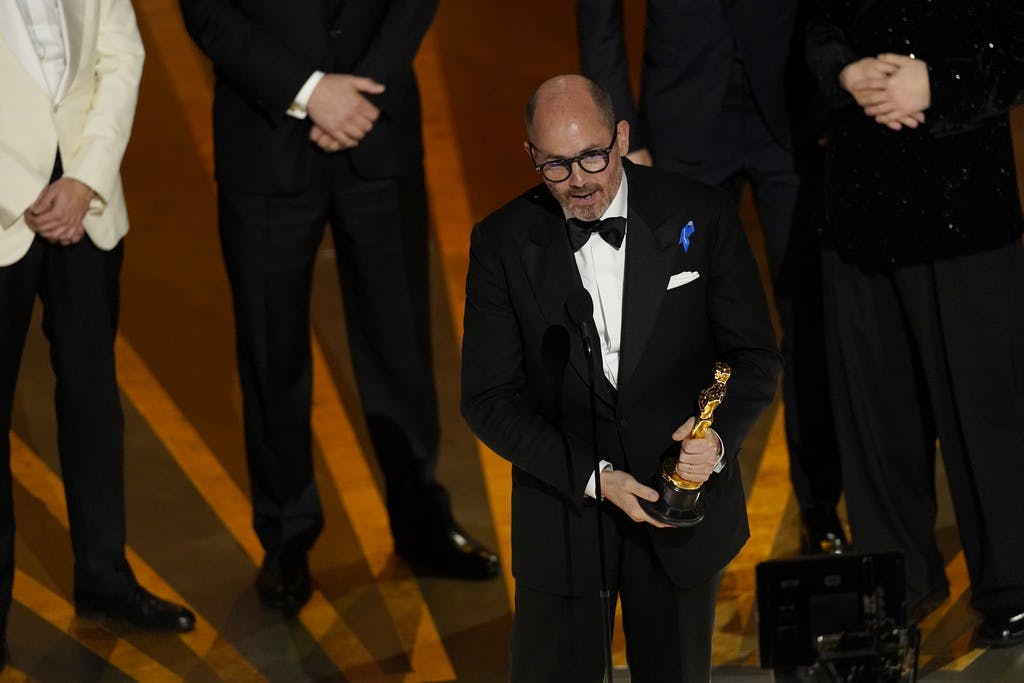Hollywood Cools on Ukraine, but Real Drama Is Brewing
The Academy Awards did take aim, albeit indirectly, at the principal author of Ukraine’s present pain: Vladimir Putin.

LOS ANGELES — The horrors of war were by no means absent from Hollywood’s biggest night on Sunday, but the battle raging in eastern Europe was notably absent from the spotlight. Whether that is indicative of flagging interest with the war in Ukraine, or simply an oversight in an already culturally freighted event, is debatable, but the 95th Academy Awards ceremony at Los Angeles may have marked an unavoidable inflection point not lost on some in Ukraine.
In the most literal sense, that is because the Ukrainian president and Time magazine’s 2022 Person of the Year, actor-turned-politician Volodymr Zelensky, was not invited to speak at Hollywood’s Dolby Theater — either personally or virtually. Since the Russian invasion of Ukraine last year, Mr. Zelensky has made the rounds, usually virtually, of prestigious international parleys, awards ceremonies, and film festivals. Yet the Academy of Motion Picture Arts and Sciences snubbed the global icon for a second year running, declining to give a reason why.
Earlier this year Mr. Zelensky delivered a video message to the Golden Globes awards ceremony, following an introduction by Sean Penn. The Golden Globes are run by the Hollywood Foreign Press Association and, like the Academy Awards, have a large international audience.
The Academy’s snub of Mr. Zelensky drew the ire of the Ukrainian minister of foreign affairs, Dmytro Kuleba, who before the glamorous event told German magazine Bild, “I think if ‘All Quiet on the Western Front’ receives an Oscar as the Best Foreign Language Film, while President Zelensky, who … is fighting in the biggest war in Europe since World War II, is not allowed to speak at the Oscars ceremony, you will not find a better example of the hypocrisy of the film industry’s top executives and producers.”
In the event, Germany’s “All Quiet on the Western Front” won the Oscar for best international feature film. The website Ukrinform posited that the rejection of the Ukrainian leader’s speech request “caused a stir and discussions, including whether or not it may be related to skin color issues.”
Yet Hollywood did take aim, albeit indirectly, at the principal author of Ukraine’s present pain: Vladimir Putin. That is because the Oscar for best documentary went to “Navalny,” which follows an investigation into the poisoning of a Russian opposition politician, Alexei Navalny, with the nerve agent Novichok in August 2020. In an acceptance speech, the film’s director, Daniel Roher, reminded the world that Mr. Navalny “remains in solitary confinement for what he calls Vladimir Putin’s unjust war of aggression in Ukraine.”
Variety noted that Mr. Zelensky’s overtures to the Oscars came as polls show Americans’ support for providing assistance to Ukraine has weakened. Also, attention spans in Hollywood are notoriously short.
What could spell more headaches for Kyiv than the fickle nature of show business are reports that, as Politico phrased it, “U.S.-Ukraine war unity is slowly cracking apart.” It actually is not, but as in any long-term relationship, disagreements are bound to occur. Politico quoted the Republican chairman of the House Foreign Affairs Committee, Michael McCaul, as saying: “The administration doesn’t have a clear policy objective and a clear goal. Is it to drag this thing out, which is precisely what Vladimir Putin wants?”
Mr. McCaul added, “I don’t see a policy for victory right now, and if we don’t have that, then what are we doing?”
There is also growing concern expressed by “multiple” officials in the Biden administration that Ukraine “is expending so much manpower and ammunition in Bakhmut that it could sap the ability to mount a major counteroffensive in the spring.” Washington has been advising Ukraine to focus less on the battle for Bakhmut, in the Donbas, and more on preparing a counteroffensive in the south.
Yet many people close to President Zelensky have doubled down, maintaining that the longer Ukraine holds on at Bakhmut, the more it degrades Russian resources and manpower.
In an interview with La Stampa, Mr. Zelensky’s communications advisor, Mykhailo Podolyak, said that Ukraine wants “to fix them in a few key wearisome battles, to disrupt their offensive and concentrate our resources elsewhere, for the spring counteroffensive. So, today Bakhmut is completely effective, even exceeding its key tasks.”
That swagger glosses over the steep Ukrainian, as well as Russian, losses in and around the besieged city. It also comes amid growing reservations about Ukraine’s ability to both hold Bakhmut and give the anticipated spring counterassault the muscle it will likely require.
Furthermore, just last month Secretary Blinken called Crimea a “red line” for Mr. Putin, amid concerns that a possible Ukrainian offensive to retake the Russian-occupied peninsula would lead to escalation.
Mr. Blinken’s view unwittingly aligns with that of the Hungarian prime minister, Viktor Orbán, known and not always lauded for his contrarian stance with respect to the Russo-Ukrainian War. The populist leader recently described the defense of Ukraine as “not a war between the armies of good and evil” but a battle “between the troops of two Slavic countries.”
Last week, Mr. Orbán hinted that Ukraine-allied soldiers could be sent to fight in Ukraine and warned that “the world has never been so close” to a third world war.
With that kind of drama building, it is little wonder that Hollywood backed off a bit — at least this time.

